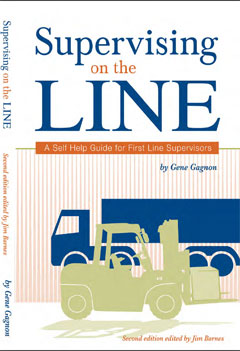From SCDigest's On-Target E-Magazine
April 5 , 2011
Logistics News: Gene Gagnon's Classic "Supervising on the Line" Updated and Re-Issued for 2011
Focus is on DC Productivity, but with A Compassionate Eye to Supervisors and Associates; Supervisors are Key to DC Success, but Usually Unappreciated and Poorly Trained
SCDigest Editorial Staff
Consulting firm enVista has republished a classic book on managing work in a distribution center, the late Gene Gagnon's Supervising on the Line, first published in 1988.
Gene Gagnon was an industrial engineer who was a pioneer in the deployment of labor standards into distribution environments. Today's Labor Management Systems (LMS) in distribution can be traced directly to the efforts primarily of Gagnon and one or two others in the early 1980s. The company he formed, Gagnon & Associates, was purchased by RedPrairie (McHugh Software at the time) in the late 1990s and was the foundation for RedPrairie's current LMS offering.
SCDigest Says: |
 |
| Gagnon likened the proper role of DC supervision to something like preventative maintenance: removing the source of potential problems before they grow into productivity-killing major issues. |
|
What Do You Say?
|
|
|
|
Gagnon passed away in 2005 at the age of 76. His son Al, who ran Gagnon & Associates before the RedPrairie acquisition, now works for consulting firm enVista. Last year, enVista president Jim Barnes decided to republish the book, with Barnes updating some of the examples, cartoons, and other features in the original, but keeping the majority of the work and certainly its soul and spirit.
Supervising on the Line has at its core one central theme: that front line supervisors, the level between associates and DC management, play perhaps the key role in distribution center performance, but one that is too often underappreciated and understood. Though Supervising on the Line is a Management book appropriate for VPs, it is written "for" those DC supervisors, not just "about" them.
"I believe that the first line supervisor cannot learn his job on the job. He can't pick up tips as the months go by and weld them together into productive management style," Gagnon notes in Chapter 1. "The warehouse business is too demanding, too fast paced, and to full of changes and surprises. "The new first line supervisor needs and deserves help the minute he gets on the job."
Those words, written in 1988, are words to live by in the DC 23 years later.
Gagnon observes that “a supervisor needs to be less of a traditional boss – one who looks over an employee’s shoulder, and fights to get the work done – and more of a coach.” That’s something an increasing number of companies recognize today.
Gagnon also continuously emphasized that the role of supervisor was in part “to remove the barriers that prevent employees from doing their best.” He was always optimistic that workers really did want to work hard (and smart) for the company – if the right environment was created for them to do so.
“It’s up to you to convince your workers that you care about them and the quality of their work, and that the company does too,” Gagnon wrote. Just listening to their concerns and ideas is the critical first step, he noted: “Nothing destroys an employee’s motivation faster than feeling no one cares about how he does his job,” he added.
 A first step for a new supervisor is to clearly understand what management expects from him or her; conversely, it is essential that management also make that clear to front line supervisors, and that the larger “game plan” is also communicated. Often, Gagnon wrote, supervisors don’t have this understanding, and are reluctant to ask for clarification. A first step for a new supervisor is to clearly understand what management expects from him or her; conversely, it is essential that management also make that clear to front line supervisors, and that the larger “game plan” is also communicated. Often, Gagnon wrote, supervisors don’t have this understanding, and are reluctant to ask for clarification.
Also related to those concepts is making sure a supervisor also understands his or her boundaries – just how much responsibility and authority really comes with the job. This is an issue that remains a source of confusion for many companies still today.
Gagnon likened the proper role of DC supervision to something like preventative maintenance: removing the source of potential problems before they grow into productivity-killing major issues. A big part of role in turn relates to effective time management, another area where few companies even today really provide skill training for supervisors?
Among the great contributions Gagnon made to the industry was focusing management attention on lost time and excessive “indirect” time in the DC.
(Distribution/Materials Handling Story Continues Below)
|